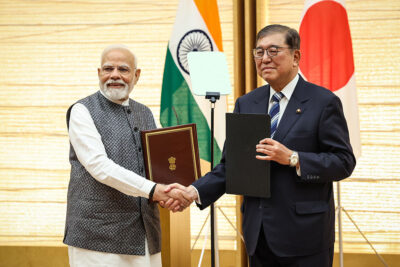
TOKYO, JAPAN – AUGUST 29: India’s Prime Minister Narendra Modi and Japan’s Prime Minister Shigeru Ishiba shake hands during a joint press conference in Tokyo on August 29, 2025 in Tokyo, Japan. Modi is on a diplomatic visit to Japan. (Photo by Takashi Aoyama/Getty Images)
India and Japan have reinforced their Special Strategic and Global Partnership with a strong focus on economic security and future-ready industries. The collaboration spans across semiconductors, clean energy, critical minerals, information technology, and pharmaceuticals, underscoring both nations’ shared vision for resilient supply chains and innovation-led growth.
During Prime Minister Narendra Modi’s visit to Tokyo, the two democracies launched the India-Japan Dialogue on Economic Security, creating a comprehensive framework for cooperation in strategic trade and technology. A parallel private sector track has also been initiated between Keidanren and CII to deepen industry-level collaboration.
In semiconductors, India’s Ministry of Electronics and IT and Japan’s Ministry of Economy, Trade and Industry signed a cooperation pact, leading to projects such as Renesas–CG Power’s OSAT facility in Gujarat, academic collaborations under the Chips to Startup programme, and a Tokyo Electron–Tata Electronics partnership. Japan is also supporting Tamil Nadu’s start-up ecosystem in emerging technologies through yen loan assistance.
The critical minerals sector has gained momentum with a new memorandum of cooperation, expanding joint work on rare earths and critical minerals, building on projects like Toyota Tsusho’s refining initiative in Andhra Pradesh. Both sides are also engaging via Mineral Security Partnership and Quad Critical Minerals Initiatives.
In information and communication technology, collaboration has intensified in 5G and Open RAN systems, with NEC and Reliance Jio partnering on infrastructure, NEC’s Chennai lab driving advanced R&D, and Japanese-backed expansion of NTT’s data centre footprint in India.
Clean energy is another pillar, marked by agreements on the Joint Crediting Mechanism and clean hydrogen and ammonia. Projects include ammonia co-firing at Adani Power’s Mundra plant, a JBIC–Osaka Gas–Clean Max renewable portfolio, and new investments in biofuels and green hydrogen.
This year has also been designated as the Year of Science, Technology and Innovation Exchanges, accelerating cooperation in AI, quantum, biotechnology, space, and climate solutions. Initiatives like the India-Japan AI Cooperation Initiative, Digital Partnership 2.0, and Sakura Science exchanges highlight the momentum. Private sector projects, such as NTT Data and Neysa Networks’ AI data centre in Hyderabad, are further strengthening collaboration.
In pharmaceuticals, both countries are building a resilient biopharmaceutical supply chain through regulatory and research collaborations. JBIC is extending financing to Japanese firms engaged in India’s pharmaceutical and chemical industries, adding strategic depth to this cooperation.
With these wide-ranging initiatives, India and Japan have laid a strong foundation for a future-driven partnership that integrates security, innovation, and sustainable growth.
(This content is sourced from a syndicated feed. The Japan India Manufacturing Journal website assumes no responsibility or liability for its accuracy, completeness, or content.)




COMMENTS